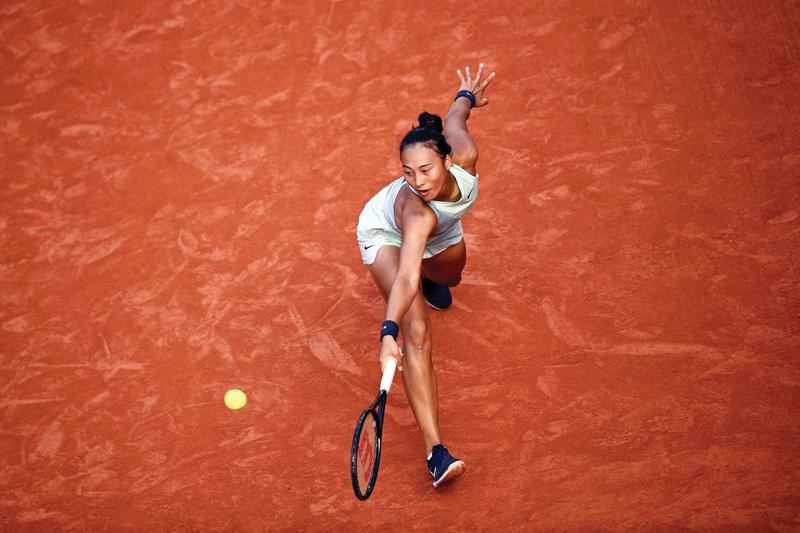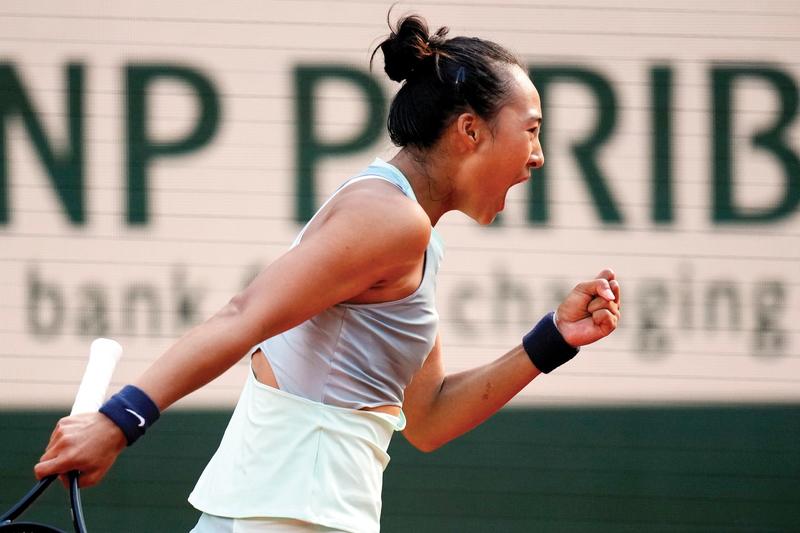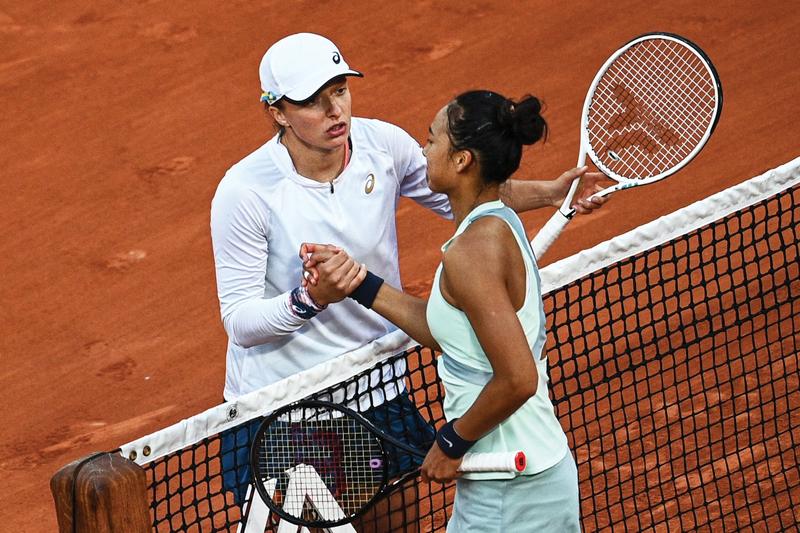 China’s Zheng Qinwen returns to Poland’s Iga Swiatek during their French Open fourth-round match in Paris on May 30. Zheng, who was making her Roland Garros main-draw debut this year, won the first set but could not maintain that momentum and lost 7-6(5), 0-6, 2-6. (PHOTO / AFP)
China’s Zheng Qinwen returns to Poland’s Iga Swiatek during their French Open fourth-round match in Paris on May 30. Zheng, who was making her Roland Garros main-draw debut this year, won the first set but could not maintain that momentum and lost 7-6(5), 0-6, 2-6. (PHOTO / AFP)
Despite a painful French Open exit at the hands of the world No 1, Zheng Qinwen is looking toward a bright future at the top level as the buzz builds around the Chinese teenager.
On May 30, Zheng gave top-seeded Iga Swiatek a huge scare before eventually losing their fourth-round match 6-7 (5), 6-0, 6-2 — a heroic effort from the 19-year-old despite playing with her right thigh strapped and, as she later revealed, her stomach cramping.
Zheng fought back from 0-3 down in the first set to force a tiebreak as 2020 champion Swiatek went on to drop a set for the first time in over a month.
Suffering from severe menstrual pain throughout the match, Zheng took a medical timeout early in the second set to treat a pulled muscle, and afterward revealed the stomach cramps had badly limited her movement and striking motion.
“Competing at such a high level with such strong intensity, the pain grew so much that at one point I felt like I was dying on the court,” Zheng, a native of Hubei province, said at the post-match news conference.
“It’s just a girl thing. The first day is always so tough and then I have to do sport ... I couldn’t go against my nature. I wish I could be a man so that I wouldn’t have to suffer from this. It’s tough.”
In an 82-minute opening set, Zheng saved five set points and rallied from 2-5 down in the tiebreak to reel off five straight points, with fierce serves and forehands sending the Court Philippe Chatrier spectators to their feet.
 China’s Zheng Qinwen returns to Poland’s Iga Swiatek during their French Open fourth-round match in Paris on May 30. Zheng, who was making her Roland Garros main-draw debut this year, won the first set but could not maintain that momentum and lost 7-6(5), 0-6, 2-6. (PHOTO / AP)
China’s Zheng Qinwen returns to Poland’s Iga Swiatek during their French Open fourth-round match in Paris on May 30. Zheng, who was making her Roland Garros main-draw debut this year, won the first set but could not maintain that momentum and lost 7-6(5), 0-6, 2-6. (PHOTO / AP)
Swiatek had last lost a set on April 23 against Liudmila Samsonova of Russia in a three-set win in the semifinals in Stuttgart.
After getting her leg strapped, Zheng’s physical discomfort took a heavy toll on her game as the teenager struggled to keep up with the pace and power of Swiatek’s attack, losing the next two sets before walking off the court to applause from the crowd and her opponent in recognition of her brave fight.
“Zheng played amazing tennis,” Swiatek said after extending her winning streak to 32 matches to equal this century’s third-best mark, set by Belgian great Justine Henin in 2008.
“I felt on my racket today that she can play some really heavy top spin, and I feel like if she’s going to use it the right way she can really be a great player,” said Swiatek, who will next play 11th seed Jessica Pegula of the United States in her third straight quarterfinal in Paris.
Although it took place early on the morning of May 31 Beijing time, Zheng’s match still garnered huge attention in China, with her shot highlights and post-match interview becoming top trending topics on Weibo.
Zheng’s rise to prominence eight years after two-time Grand Slam champion Li Na retired has excited the tennis community in China, where fans have been longing for the emergence of a new homegrown star.
 China’s Zheng Qinwen returns to Poland’s Iga Swiatek during their French Open fourth-round match in Paris on May 30. Zheng, who was making her Roland Garros main-draw debut this year, won the first set but could not maintain that momentum and lost 7-6(5), 0-6, 2-6. (PHOTO / AFP)
China’s Zheng Qinwen returns to Poland’s Iga Swiatek during their French Open fourth-round match in Paris on May 30. Zheng, who was making her Roland Garros main-draw debut this year, won the first set but could not maintain that momentum and lost 7-6(5), 0-6, 2-6. (PHOTO / AFP)
Her inspirational run in Paris, which included a second-round victory over former world No 1 Simona Halep of Romania, has bolstered Zheng’s belief that she can succeed on the Grand Slam stage, having made her major debut at the Australian Open in January.
“I’ve always known I have what it takes to be able to compete and excel at this level,” said Zheng, who grew up idolizing Li, the winner of Asia’s first singles major trophy when she won in Paris in 2011.
“With my run this year at Roland Garros, I think I’ve proved to everyone that I belong here and I’ve achieved the breakthrough that I’ve long believed I can.
“I don’t feel that the gap (to the top 20) is as big as the rankings suggest. The biggest difference is the lack of experience.”
Encouraged by her parents, Zheng picked up a tennis racquet for the first time aged 6 in her native city Shiyan, Hubei province.
She later moved to Beijing to develop her talent at an academy run by Argentine Carlos Rodriguez, who was Li’s coach when she won her second major at the 2014 Australian Open.
Now based in Barcelona training with Spanish coach Pere Riba, a former ATP world No 65, Zheng has set her sights on diversifying her arsenal beyond her blistering forehand and serve in order to mix it up with the world’s best.
“Gradually, I’ve realized that tennis is an all-round sport which is not only about power and speed. I have to diversify my shot variety, try new things and develop more tactics, while still holding onto my strength to become a more competitive player,” said Zheng, whose drop shots in particular caused both Halep and Swiatek — in the first set — huge problems.
Now pushing close to the top 50 thanks to her last-16 run in Paris, Zheng is expected to directly enter the main draw for Wimbledon, which begins on June 27.
“I really enjoy playing on big courts to the rousing reaction from the crowd,” said Zheng. “Next time I face the world No 1, I hope I can bring out my best 100 percent.”
Swiatek, meanwhile, suspects a star is in the making. “I hope she’s gonna stay here, because she can really play great tennis, and that I know,” the Pole said.



